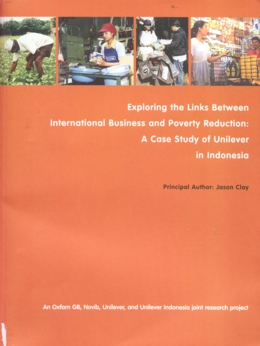 Foreign direct investment is recognised to be important for economic development, in terms of wealth creation, employment, skills development, and technology transfer. But there is an on-going debate about the extent to which these contributions translate into real benefits for people living in poverty.
In an attempt to evaluate the impacts of international business on people living in poverty, two organisations with very different aims and perspectives – Unilever (a major company operating in some of the poorest countries in the world) and Oxfam (an international development and humanitarian organisation) – collaborated on an ambitious research project. The research considered the impacts of Unilever Indonesia across the entire business value chain, from producers and suppliers, through the company’s core business operations, to its distributors, retailers, and consumers. This report presents the findings of the research. It is a contribution to the debates among the wider business community, governments, civil-society organisations, and academics who seek to understand how the wealth, employment, and products that a large compay creates could bring increased benefits to people living in poverty. Contents: Acronyms and Abbreviations
Foreword: Oxfam
Foreword: Unilever
Executive Summary 1. Introduction 2. The Impacts of Unilever Indonesia at the macro-economic level 3. The employment impacts of Unilever Indonesia 4. The value chain from supply to distribution 5. Low-income consumers in the marketplace 6. UI’s wider impact in the community 7. Conclusions Notes References and sources Appendix 1: The Project team
Appendix 2: UI product list, 2003
Post Date : 13 Oktober 2008
| 